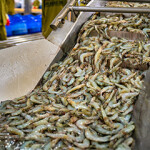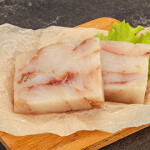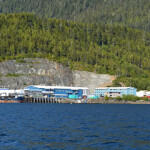Japan’s Seven & i Holdings cuts plastic, adds MSC and ASC products

Seven & i Holdings, based in Tokyo, Japan, announced in May its environmental goals for its group companies, under the slogan: “GREEN CHALLENGE 2050.”
The holding company owns major Japanese supermarket chain Ito-Yokado as well as regional supermarket York-Benimaru. It also owns Sogo and SEIBU department stores and Denny’s restaurants in Japan, the 7-Eleven convenience store chain in Japan, and it bought out 7-Eleven Inc. in the United States. The environmental goals recently announced apply to the company’s Japanese operations.
The challenge consists of environmental targets for the years 2030 and 2050, and cover a wide range of fields including reduction of carbon dioxide emissions, reduction of food waste, and use of sustainably-sourced food ingredients. The areas that bear most on seafood are a reduction of plastic bags – to address the problem of micro-plastics in the ocean – and sustainable sourcing of seafood items.
Ito-Yokado and York-Benimaru started charging for shopping bags in 2012, and nearly 73 percent of customers declined shopping bags in the food sales areas of Ito-Yokado in fiscal year 2018. In the future, a verification test will be conducted at 7-Eleven stores to test the introduction of paper bags, and to examine the utilization of other environmentally friendly materials like biomass, biodegradable, and recycled materials.
The group has also installed 759 PET (polyethylene terephthalate) bottle collection machines. They collected approximately 300 million PET bottles, amounting to 8,900 metric tons, in fiscal year 2018. Seven & i Holdings plans to recycle the PET bottles and use them for its private branded products.
Regarding sustainable procurement, the group began selling Marine Stewardship Council (MSC) certified mentaiko (spicy pollock roe) under its house brand, “Seven Premium.” There are four mentaiko products: Seven Premium Karashi Mentaiko, 110 grams, priced at 398 yen, or 429 yen (USD 3.99, EUR 3.51) with tax; Seven Premium Low-salt Hitokuchi Spicy Mentaiko, 110 grams, at 398 yen, or 429 yen (USD 3.99, EUR 3.51) with tax; Seven Premium Hitokukuchi Mentaiko, 120 grams, at 398 yen, or 429 yen (USD 3.99, EUR 3.51) with tax; and Seven Premium Hitokuchi Mentaiko, 70 grams, at 298 yen or 329 yen (USD 3.06, EUR 2.69) with tax. Karashi is red pepper and hitokuchi means “bite-sized.”
“7-Eleven operates as a franchise business, so each store has the right to decide what products they are going to sell,” Shandar Timar, a staff member of Seven & i Holding’s PR Department, told SeafoodSource. Thus, the mentaiko may not be offered in every shop. He said that an additional product, boiled mackerel with miso sauce, has been added since the initial announcement.
Mayu Nakayama, senior commercial officer for MSC in Japan, said that the Seven & i group has made a commitment to expand the offerings further in future. Nakayama said that the group is not required to acquire a Chain of Custody (CoC) certification, such as that acquired by Aeon supermarkets, because they are not repacking. Instead, they have private label items packed by a certified processor. About 200 companies in Japan have acquired MSC’s CoC certification so far.
An Aquaculture Marine Stewardship Council (ASC) certified product, farmed oysters, is being offered at Seven & i group’s Ito-Yokado stores. This product is the result of a project advanced by the Tokura Office of the Miyagi Prefecture Fisheries Cooperative’s Shizugawa Branch. Ito-Yokado joined the project at an early stage, in 2011, and first sold the product in October 2016. This was the first sale in Japan of ASC-certified farmed oysters.
ASC certification is an aquaculture version of MSC but is administered separately from MSC in Japan. Although the Japanese ASC office was established only in 2017, Japan has now the fourth most certified aquaculture farms in the world.






Share